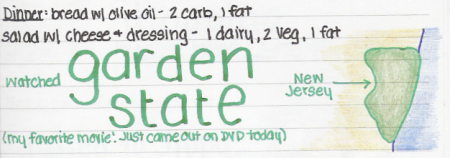I am officially the LAST person to blog about this study, but my thoughts seem to be pointed in a different from the other posts that I’ve read.
The Psych Central article, “Half of Young Adults Have Mental Disorder,” states the following:
“A total of 45.8 percent of college students and 47.7 percent of young adults not in college met the criteria for at least one psychiatric disorder.
The most common disorders in college students were alcohol use disorders (20.4 percent) and personality disorders (17.7 percent), whereas those not in college most frequently met criteria for personality disorders (21.6 percent) and nicotine dependence (20.7 percent).”
Now personally, I don’t lump alcohol use disorders and nicotine dependence under the umbrella of psychiatric disorders. Definite health problems — yes. Addictions — sure.
I think that Health News explained these results much more accurately:
“The effects of today’s lifestyles are taking some telltale tolls on many, and most especially on young adults. A recent analysis of more than 5,000 young people between the ages 19 to 25 has revealed that almost 20 percent of young adults in America have psychiatrics disorders that interfere with their everyday lives. Furthermore, the percentages of young adults who are abusing alcohol or drugs are even higher.”
20% is still a pretty alarming statistic, especially since the study found that “less than 25 percent of these college-aged youngsters who suffer from mental problems actually seek treatment.”
Laura Collins blogs that “it is obviously NORMAL if half of young adults have mental disorders.” Personally, I feel that when a majority of individuals of a disorder, that it is time to redefine “disorder.” Think, what if we considered yo-yo-dieting a diagnosable eating disorder? It’s definitely unhealthy and probably stems from personal issues, cultural expectations, other mental health issues, etc. but is it a disorder?
My point is that maybe the baseline of “normal” needs to be adjusted. I guess that there are two ways that you could approach this… either say that the quality of “normal life” should be lower (aka: moderate depression, anxiety, and substance abuse being the norm) or that society as a whole should be healthier.
Making society healthier is clearly the harder option. However, the first option of just accepting a degree of mental illness as a fact of life, is pretty depressing.
I would never say that all of these mentally-ill college students shouldn’t receive help… but I think when percentages start to reach this magnitude you need to look at global changes rather than specific, individual treatment. It is impractical (and nonsensical) to try and setup each of these kids with a therapist, psychiatrist, group therapist, etc. Counseling centers are already overloaded — no way could they handle that.
There is a lot of talk about the stigma that surrounds mental illness and its corresponding treatment. I don’t think that you can wait for this to subside to make mental health treatment more available, though. It needs to work in the opposite direction — first make treatment more common and easily accessible.
I think that college kids are much more open to getting help than others realize. My school had “stress reduction” as a PE class — and it was ALWAYS full. It was probably one of the hardest classes at the University to get into. Why aren’t there five of them? Why isn’t there a stress reduction group at the counseling center? I guarantee you that if there were a pre-med support group, that it would be packed. The pre-med track is stressful and probably causes a lot of the anxiety, depression, insecurity, and whatever else that causes more significant mental illness.
Why aren’t there art therapy groups at Universities? I was in IOP during my freshman year and my two best friends would kid that they wanted to make up eating disorders so that they could go to art therapy, too. Why do you have to have a significant mental illness to go to art therapy? Everyone could come up with something to process.
The system is setup so that you have to be sick to get help. The mental illness stigma is encouraged by the barriers to treatment. Seriously, create a program of “supportive groups” — regular misc. process groups, art therapy, stress relief groups, career-centric groups, psychodrama, grief & loss therapy, relationship issues group — whatever! I swear that students will come. If you offer a little more support to everyone, then treatment will seem less weird and fewer people will reach the point of needing intensive help.


 Examples from my own history:
Examples from my own history:
